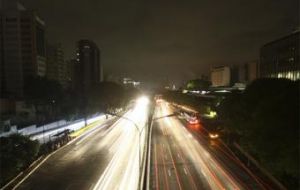MercoPress. South Atlantic News Agency
Massive blackout in Brazil exposes vulnerability of energy infrastructure
 An estimated 53 million people in eight states were affected
An estimated 53 million people in eight states were affected A widespread blackout hit at eight states in Brazil's northeast Friday exposing energy infrastructure vulnerabilities of the nation that will host an Olympics and a World Cup.
Officials and local news reports indicated the power failures began in the early morning hours and quickly spread around the massive region. An estimated 53 million people were affected by the blackout in the states of Bahia, Sergipe, Alagoas, Rio Grande do Norte, Pernambuco, Paraiba, Piaui and Ceara.
Mozart Bandeira Arnaud, director of operations at the Sao Francisco Hydroelectric Company, the biggest supplier of energy in the area, told the Globo TV network the power was mostly restored by 8 a.m. and that the problem originated in a substation that fed high-transmission lines leading to three other energy suppliers, causing the failure to ripple across the region.
“There was a failure in an electronic component that was part of protection system of the substation,” said Arnaud.
He said this triggered the security system of the Luiz Gonzaga substation in Pernambuco state to automatically shut down, cutting power to six high-transmission power lines running from the station, causing the blackouts to quickly spread.
“As the substation was very large, the effects were felt in several regions,” Arnaud told Globo.
Dilton da Conti Oliveira, president of the Sao Francisco Hydroelectric Company, told reporters in Recife, a major city in the northeast, that “the most important thing now is that the cause of the problem is not preventing the restoration of energy.”
The power failures again raise questions about the robustness of Brazil's energy grid as the nation's economy rapidly expands and demands for more energy rise. It also raises worries about a secure energy supply as Brazil prepares to host the 2016 Olympics and the 2014 World Cup.
Four state capitals hit by Friday's blackout are host cities for World Cup football matches.
In 2009, a massive power failure left more than 60 million people in the dark in 18 states. Hard-hit then were Sao Paulo, South America's largest city, and Rio de Janeiro, which will host the 2016 Olympics. That failure was blamed on problems at a substation after heavy storms, but no official report was ever revealed.




Top Comments
Disclaimer & comment rulesCommenting for this story is now closed.
If you have a Facebook account, become a fan and comment on our Facebook Page!